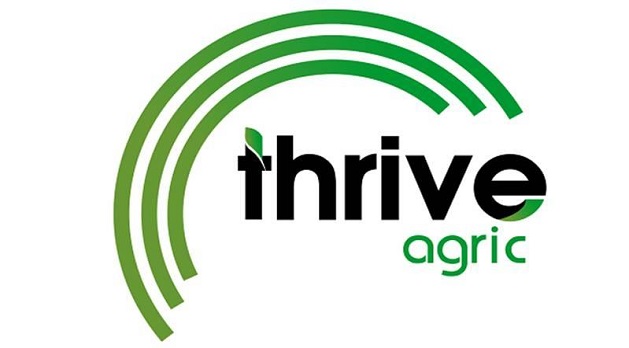News
ThriveAgric Kicks-off Phase Two Distribution of Agricultural Inputs

ThriveAgric, agricultural technology company, has flagged off the ThriveAgric 2023/2024 dry season farming cycle with the distribution of agricultural input, targeting over 100,000 smallholder farmers in northern Nigeria to facilitate the production of over 300,000MT of grains.

ThriveAgric would provide farmers with irrigation facilities, drought-resistant input, access to technology, storage, and premium markets to help optimise output in this farming cycle. The flag-off was announced at an event in Jigawa state, Nigeria.
The event brought together various stakeholders including financial institutions, government officials, farmers, and representatives of the farming communities from Jigawa, Bauchi, and Kano. Conversations centred on the challenges and opportunities of crop cultivation during the dry season.
Participants shared valuable insights on optimising crop yields, implementing effective water management, and developing coping mechanisms for the drought conditions often associated with this period.
Smallholder farmers encounter challenges during the dry season, stretching from August to September in the South of Nigeria and September to April in the North.
With sparse rainfall and high temperatures, dry-season farming is extremely dependent on irrigation – access to water sources and drought-resistant seeds become crucial, affecting food security.
According to the World Bank, only 1 percent of Nigeria’s agriculture is irrigated, and expanding and optimising irrigation infrastructure is key to increasing sectoral productivity.
Speaking on the significance of the dry season to Nigeria’s agriculture, Oshone Anavhe, Vice President, Operations at ThriveAgric said, “In Sub-Saharan Africa, approximately 95% of food production relies on rainfed agriculture.
“The dry season however remains mostly under-utilised for farming due to the absence of necessary infrastructure and widespread unavailability of drought-resistant inputs.
“For this 2023/2024 farming cycle, ThriveAgric is leveraging partnerships to impart thousands of smallholder farmers, especially those in the wheat, rice and maize value chain, by providing them with access to technology, irrigation facilities, drought-resistant input and premium markets.
“If harnessed at national scale, dry season farming has the potential to jumpstart food sufficiency in Nigeria, therefore we call on the government to invest in enabling infrastructure that would in turn attract investors and engage more farmers for dry season farming.”
Matthew Omega, Regional Manager, Sterling Bank commented, “We believe in the transformative power of agriculture to drive economic growth and sustainability. Our collaboration with ThriveAgric exemplifies our commitment to providing innovative and accessible financial solutions for farmers.
“By joining forces, we aim to empower smallholder farmers, and the agricultural communities, promote responsible financial practices, and cultivate a future where prosperity and sustainability co-exist.”
In line with its mission to build the largest network of profitable farmers, over the years, ThriveAgric has utilised strategic partnerships with both private and government institutions to implement initiatives that directly improve the social condition and economic prospects of hundreds of thousands of smallholder farmers in Nigeria.
By providing farmers with access to irrigation facilities during the dry season, ThriveAgric farmers are able to 2x or 3x their regular yield thereby increasing their profitability, positively impacting their standard of living while also boosting food security in the country.
News
NGX Group Chairman Seeks Regional Collaboration to Unlock West Africa’s Trade, Investment Potential

Umaru Kwairanga, chairman, Nigerian Exchange Group (NGX Group), has called for stronger regional cooperation to harness the untapped potential of West Africa’s trade and commodity markets.

Speaking at the inaugural West Africa Economic Summit (WAES) 2025 held under the theme “Unlocking Trade and Investment Opportunities in the Region”, Kwairanga highlighted the critical role of capital markets and commodity exchanges in transforming the region’s abundant natural resources into organised, transparent capital that fuels industrialisation and inclusive economic growth.
The summit brought together key stakeholders from across West Africa to deliberate on strategies for accelerating regional integration, strengthening capital markets, and unlocking the full potential of intra-African trade.
In his remarks during a high-level panel on “Commodities as Capital: Regional Commodities Exchange & Reserves”, Kwairanga noted that despite West Africa’s wealth of raw materials, the region continues to face a paradox of resource abundance coexisting with capital scarcity.
“As a nation and region, we are abundantly rich in raw materials, but often poor in capital outcomes. This paradox is not due to a lack of resources, but due to the way these resources have historically been excluded from structured financial ecosystems.
Commodities, whether agricultural, mineral, or energy, must be seen not just as tradeable goods, but as investable assets capable of powering industrialisation, job creation, and macroeconomic stability,” he said.
Kwairanga emphasised NGX Group’s commitment to building resilient market infrastructure that supports price discovery, clearing, settlement, and investor protection, systems that can underpin thriving regional commodity markets.
He highlighted NGX Group’s role in mobilising capital for commodity value chains through IPOs, bonds, and structured funds, citing the success of NGX-listed companies like Presco and Okomu Oil as models for attracting long-term investment.
On the question of regional versus national commodity exchanges, Dr. Kwairanga advocated for a dual approach that combines the strengths of national platforms with the scale and integration benefits of regional frameworks.
“National exchanges address local needs and build depth, but for West Africa to unlock the full potential of commodity trade, we must connect these markets under a regional structure.
“Regulatory harmonisation will be key, and this is where NGX Group’s experience in governance, coupled with platforms like the African Exchanges Linkage Project and the Pan-African Payment and Settlement System, can help align standards and enable seamless cross-border transactions,” he stated.
Addressing liquidity challenges, Kwairanga outlined the need for harmonised rules, trustworthy infrastructure, product innovation, and incentives to drive participation. He called for public-private partnerships and regional integration to deepen market liquidity and ensure efficient price discovery.
Beyond the panel discussions, Kwairanga commended the vision of President Bola Tinubu and the Minister of Foreign Affairs, Ambassador Yusuf Maitama Tuggar, for spearheading the summit. “There is power in unity and prestige in size. The great economic powerhouses of the 21st century, such as the United States and China, have risen to prominence partly because of the scale of their markets.
A united West Africa can achieve the same if we work together on initiatives like this,” he said, expressing optimism that the summit would produce actionable frameworks to reduce trade barriers, encourage regional investment, and fast-track economic growth across ECOWAS.
NGX Group, he added, remains committed to supporting cross-border investments, citing its participation in the African Exchanges Linkage Project and the increasing regional footprint of NGX-listed companies such as Dangote Cement, First Bank, Zenith Bank, Access Bank, and Ecobank.
News
DBN Awards N13m in Grants to Tech Startups

Development Bank of Nigeria (DBN) has awarded a total of N13 million in grants to three standout tech startups at the 2025 Techpreneur Summit held in Lagos, reinforcing its commitment to innovation and inclusive growth among Nigeria’s micro, small, and medium enterprises (MSMEs).

The winners include: BuyScrap, a digital marketplace for recyclable materials – N6 million; Qiqi Farms, which connects local farmers to hospitality and export markets – N4 million; Eco-Cyclers, a youth-led recycling initiative based in Enugu – N3 million
Alongside the grant awards, DBN also launched a new digital data asset, a first-of-its-kind platform aimed at enabling data-driven decisions within the MSME ecosystem.
The platform offers deep insights into business trends, sector-specific challenges, and growth opportunities—supporting smarter policymaking and targeted investments.
In his keynote address in Lagos, Tony Okpanachi, managing director/ CEO, DBN, described the event’s theme, “CTRL + SHIFT: Tech Empowered Movement for Naija,” as a strategic call to reimagine enterprise development in Nigeria.
“This isn’t just a keyboard shortcut,” he said. “It’s a mindset reset—powered by technology—to build a more inclusive, innovative, and resilient business landscape. From financing to innovation, DBN remains committed to enabling MSMEs to thrive.”
Okpanachi emphasized that the Summit aligns with DBN’s AMPLIFI Strategy, which integrates digital transformation, sustainability, and scalability into its core programs.
He highlighted initiatives such as the Digital Shift Workshops and the Eco-Innovation Challenge as key steps toward embedding innovation in Nigeria’s MSME sector.
Encouraging young innovators, he added: “The future belongs to those bold enough to imagine and build it. DBN is proud to support the ideas that will shape tomorrow.”
A major highlight was the unveiling of the DBN Data Asset—a digital platform designed to provide real-time, evidence-based insights into Nigeria’s MSME landscape.
The platform combines DBN’s proprietary data with external sources like the National Bureau of Statistics (NBS) to offer a comprehensive view of MSME performance by region and sector.
Jeremy Dan Okayi, DBN’s Head of Strategy, Policy & Innovation, described the platform as: “A reservoir of insight, potential, and direction—built on two years of collaboration and shared vision. This tool will support informed decision-making across the public and private sectors.”
News
FCCPC Shuts France, Belgium, and Italy Visa Centres in Abuja Over Alleged Consumer Rights Violations

In a bold enforcement action, the Federal Competition and Consumer Protection Commission (FCCPC), supported by the Nigeria Police Force and the Nigeria Security and Civil Defence Corps (NSCDC), has sealed off the visa application centres of France, Belgium, and Italy in Abuja over alleged consumer protection breaches and obstruction of regulatory investigations.

The affected centres—located at Mukhtar El-Yakub House in the Central Business District and operated by TLS Contact, a Teleperformance Company—were shut down following reports that they refused to accept formal correspondence from the FCCPC regarding a consumer complaint. The Commission cited further infractions, including obstruction of investigation and alleged assault of its officers during lawful duties.
Speaking to journalists at the scene, Mrs. Boladale Adeyinka, Director of Surveillance and Investigations at the FCCPC, explained: “This is an enforcement operation against TLS. On March 25, 2025, we served them a letter to address a consumer complaint, which they refused to accept. Instead, TLS officers assaulted our team, and in a subsequent visit on June 17, they also allegedly assaulted uniformed police officers.”
Citing Section 33 of the Federal Competition and Consumer Protection Act (FCCPA), Mrs. Adeyinka emphasized that failure to comply with Commission directives constitutes a criminal offense, punishable by imprisonment, fines of up to ₦20 million, or both.
TLS has been ordered to appear before the Commission on June 20, 2025, to provide testimony, submit evidence, and make formal depositions. The company may be held liable for any financial losses suffered by applicants due to the disruption of visa services.
Despite multiple requests for comment, management at TLS Contact declined to respond as of press time.

 Telecom1 day ago
Telecom1 day agoMTN Says New N6.98 USSD Charge Won’t Affect Airtime Recharge

 General News1 day ago
General News1 day agoStudy Reveals 7% of Industrial Organizations Tackle Vulnerabilities Only When Necessary

 General News1 day ago
General News1 day agoNITDA, NCFRMI Forge Strategic Alliance for Inclusive Digital Transformation of Displaced Nigerians

 E-Financial1 day ago
E-Financial1 day agoSofri Rejigs Digital Platforms for Better Customer Experience

 Telecom1 day ago
Telecom1 day agoNnaemeka Ani Calls on African Techies to Rewrite the Narrative

 Telecom1 day ago
Telecom1 day agoCrypto Scam Unmasked: U.S. Recovers Record $225m in Global Fraud Bust

 E-Financial1 day ago
E-Financial1 day agoDLM Group Unveils Innovative Sovereign Bond Backed Composite Notes

 E-Financial1 day ago
E-Financial1 day agoFidelity MD,Onyeali-Ikpe Champions Lifelong Learning and Sisterhood for Women’s Career Growth



























